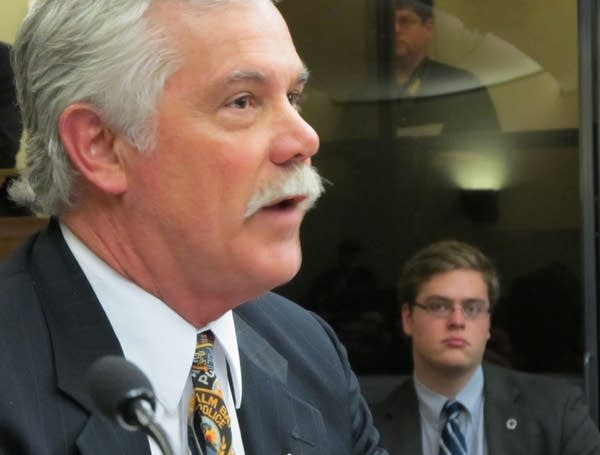House panel OKs 'Castle Doctrine-plus' gun bill
Go Deeper.
Create an account or log in to save stories.
Like this?
Thanks for liking this story! We have added it to a list of your favorite stories.

A House committee on Thursday approved a bill that would make significant changes to Minnesota gun laws.
While the bill covers several different areas, debate focused on when it's legal for someone to shoot another person in self-defense.
Critics of the bill describe it as "shoot first." Supporters say it's a self-defense bill.
The proposal is based on the Castle Doctrine, a legal doctrine which allows a person to use deadly force against an intruder in his or her home in self-defense. Many states, including Minnesota, have such laws.
Turn Up Your Support
MPR News helps you turn down the noise and build shared understanding. Turn up your support for this public resource and keep trusted journalism accessible to all.
But supporters of the bill say the Castle Doctrine doesn't go far enough. The bill would allow a person to shoot a trespasser who is outdoors on a patio, porch or garage -- as long as the defender has a reasonable fear for his or her safety.
Members of the House Public Safety committee listened to critics and supporters who had more sensational anecdotes than statistics to bolster their testimony.
Heather Martens is the director of an antigun violence advocacy group. Martens, who opposes the bill, told the story of a teenage girl in Ohio who was mistaken for a trespasser in 2006.
"She was 17 when she and her friends went looking for ghosts near Allen Davis' house. Davis' house was the local haunted house, or so the kids thought. That night Davis heard a noise outside but couldn't see anything so he pointed his rifle out the window and fired."
Martens said the girl was hit in the head. She survived the gunshot, and the shooter went to jail -- because Ohio didn't have a law like the one being proposed for Minnesota. Martens said states that have what she called 'shoot first' laws allow people to get away with shooting and sometimes killing innocent people.
But supporters of the bill offered anecdotes of their own.
Eric Pekeiser conducts training courses for people who've applied for conceal carry permits. He told the story of a permit holder who was being assaulted on his front lawn by two bigger men. Pekeiser said the man pulled his pistol and the two attackers ran away. Then the man called 911.
"St. Paul police showed up and immediately arrested him at gunpoint," Pekeiser said. "Searched him, handcuffed him, put him in a squad car. He spent three days in the Ramsey County jail with no access to an attorney -- no medications -- which were necessary for a medical condition he had -- sharing a cell with an accused criminal."
The bill's sponsor, Republican Rep. Tony Cornish of Good Thunder, said critics are making the same kind of dire predictions that they used to oppose the law that allows Minnesotans who qualify to carry a concealed weapon.
"I think the same thing is happening here," Cornish said. "A lot of hoopla. A lot of claims. A lot of absurdities. picking out a tragic case here, a tragic case there, thinking it's going to happen carte blanche across the state. If this passes, eventually, I believe the same thing will happen -- the Personal Protection Act -- a year or two from now we'll sit back and wonder, what was all the fuss about?"
The bill would also change other state gun laws.
It would increase the firearm purchase permit expiration period from one year to five years. It would honor concealed-carry permits from other states in Minnesota, and it would restrict law enforcement from seizing firearms from people during natural disasters. (Supporters of the bill say following the Hurricane Katrina disaster, local police illegally confiscated firearms from citizens.)
Perhaps the least controversial portion of the proposed law would increase the amount of information the state provides to the National Instant Criminal Background check system. Supporters say this provision strengthens existing measures designed to keep people who are ineligible to purchase guns from buying them.
The bill doesn't have a Senate companion. But sponsor Cornish expects one soon.
Dear reader,
Political debates with family or friends can get heated. But what if there was a way to handle them better?
You can learn how to have civil political conversations with our new e-book!
Download our free e-book, Talking Sense: Have Hard Political Conversations, Better, and learn how to talk without the tension.





